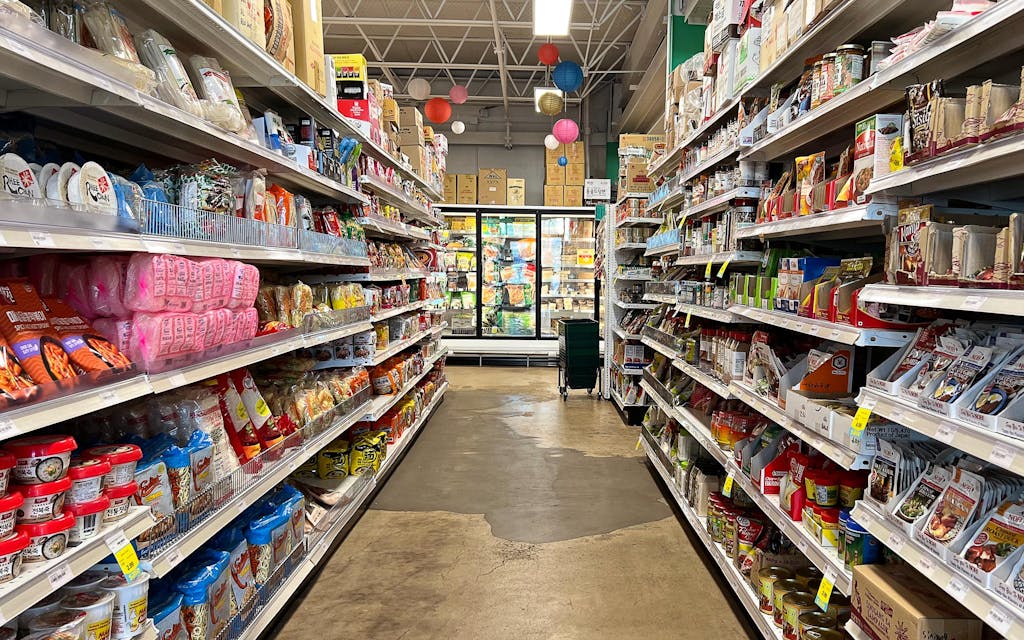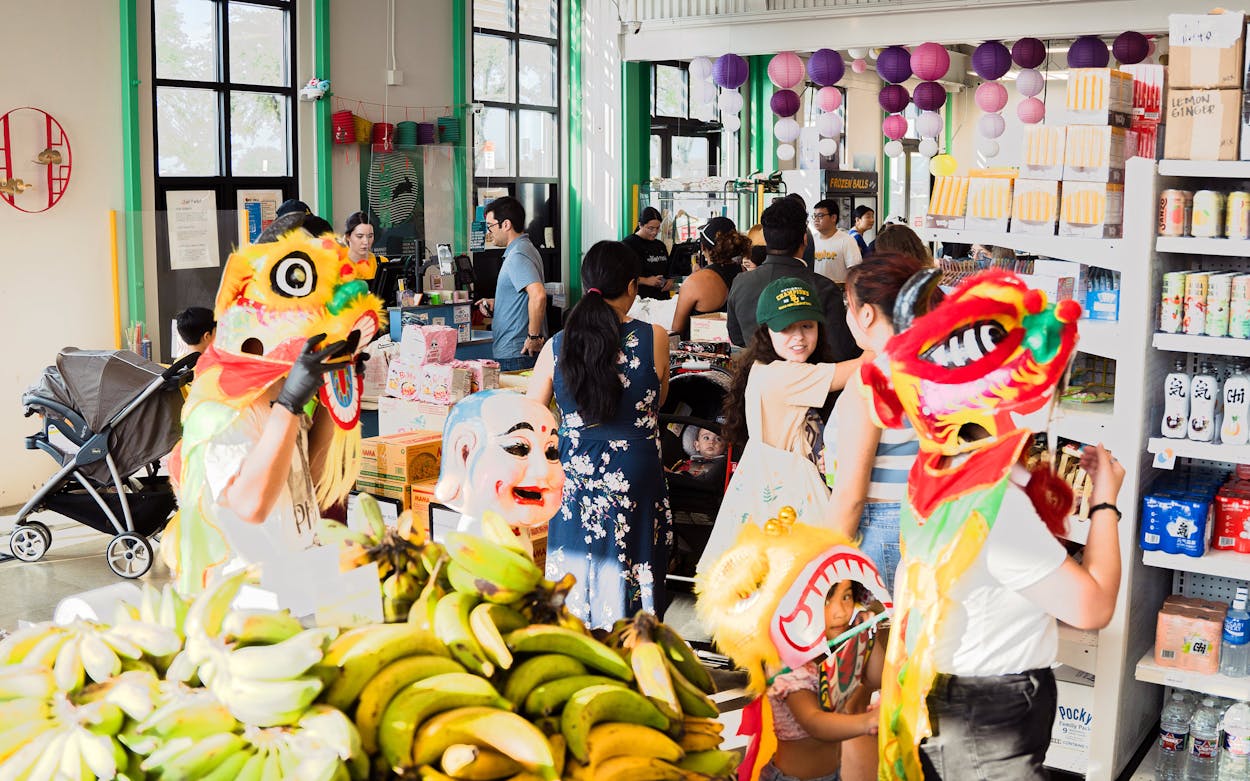During the lunch rush at East Market and Goods in Waco, the scents of wok-fired chicken and savory pancit waft through aisles of packaged bean threads and papadums. Hungry guests at the counter watch as skilled cooks whip up Filipino delicacies like crisp lumpia, grilled-to-perfection pork belly, and homey chicken adobo—dishes you can’t get anywhere else in Waco unless you have a Filipina auntie.
Tim Kulkarni and Joni Navarra, the husband-and-wife owners of the store and deli, shoulder the responsibility of operating the only Asian grocery in town. At their 6,500-square-foot space in a busy strip mall off Highway 84, Kulkarni and Navarra have developed a diverse and rotating deli menu, and stock the shelves with culinary essentials from a wide variety of Asian cultures.
The deli, open for lunch, is a tribute to Navarra’s Filipino heritage, but also features dishes like Japanese pork katsu sandwiches on fluffy house-made milk bread and keema, a chili-like dish from Kulkarni’s Indian culture. They hope to expand their menu to include dishes like dinuguan, a Filipino stew thickened with pork blood, but for now they’re focused on dishes that are more likely to sell.
In a city where Asian residents make up roughly 3 percent of the population, being approachable and palatable to non-Asians while still addressing the Asian community’s needs is a delicate balance. “We do feel the pressure,” Kulkarni says, “but that makes us want to do the best that we can.”
While he and Navarra were well-versed in Indian and Filipino food from their respective childhoods, and had eaten their way across Asia and Europe on their travels, they are new to food service. With a combined professional background in IT, food science, and retail management, Kulkarni and Navarra moved to Waco for work in 2017 and stayed for the small-town atmosphere in which to raise their two young children. Waco had everything they needed, apart from the Asian groceries they got used to while living in Houston and New Orleans. Recognizing others in Waco were seeking the same thing, they left their jobs and founded East Market and Goods in the fall of 2020.

There was once another Asian grocery in Waco, back in the 1990s. It was run by the founders of Clay Pot, Waco’s oldest and longest-operating Vietnamese restaurant, and a wholesale customer of East Market for items like rice paper, tofu, and bean sprouts. Thanh Le, the current owner of Clay Pot, says back then the Vietnamese community was too small to support a grocery, and the venture was short-lived.
“They are trying to expand the community, trying to glue us together,” Le says of Kulkarni’s and Navarra’s efforts. “I’ve introduced my culture to Waco and hosted Lunar New Year events, but my population—my customers—are more American. East Market is trying to connect all the different Asian cultures, because everybody is kind of scattered and we don’t have an official Asian group in Waco.”
Kulkarni and Navarra intentionally designed their store to be bright, inviting, and easy to navigate in order to be accessible to their clientele, which is 60 percent non-Asian. They even consider aroma when merchandising pungent products like fish balls, housing them in a dedicated cold case. While they wholesale to most of Waco’s Asian restaurants, they also provide produce such as lemons, kale, and cucumbers to businesses like Oh My Juice, a collection of juice shops in Waco, one of which is next door to East Market.
“Their prices are actually lower than big box stores, and I highly recommend them to locals for produce because they will also source items especially for you,” says Lola Flores, a manager at Oh My Juice. Flores also shops at East Market for her own family meals, snagging chili pastes, Sriracha, Thai sweet and sour sauce, and Kewpie mayonnaise, and sends her twelve-year-old son over to the deli for his favorite snack, grilled chicken skewers.
Kulkarni and Navarra have heard through the grapevine that their market has been called “the white people’s Asian store” by Asian customers who want to see more Asian employees working there. “That’s a pain point,” Kulkarni says. “We didn’t get any Asian applicants, so we had to train everyone.” To address these concerns, Navarra makes her presence known when she sees Asian shoppers browsing the aisles, so the customers “know there is an Asian behind the scenes,” she says.
And then there’s the challenge of pleasing the diverse members of the Asian community. “Every dish has regional differences, familial differences, and people are fiercely loyal to the dishes they know, down to the brand of ingredients they use,” Kulkarni says. It’s tough to get it right for everyone, he admits, especially since Asian Americans are the fastest-growing demographic in the U.S., and many of the 6,700 new Wacoans who moved there in last eight years have come from cities with diverse grocery options such as Seattle, New York City, and Washington, D.C.
Waco’s Asian community is becoming more visible, Navarra says, and it’s coalescing around East Market and at events like its upcoming Lunar New Year Festival on Sunday, where 28 vendors will set up in the parking lot. While making purple yam and yellow mung bean mooncakes—a traditional new year’s treat—for the five thousand expected attendees, Navarra reflects on the strides they’ve made within the local Asian community. “We’re coming out of hiding,” she says. “People come out from the little pockets right outside of Waco, too—Gatesville, Lacy Lakeview.”
Long hours of recipe development, staff management, and schlepping to Dallas for ingredients are all part of the labor of love that is operating East Market and Goods. “It’s that American entrepreneurship—bootstraps and shoelaces and belt buckles,” Kulkarni says about what keeps them going. “And it is the first-generation Asian modus operandi: Use what I have, do what I know I can knock out of the park, and try to make a better community and life for the next generation.”
- More About:
- Waco






